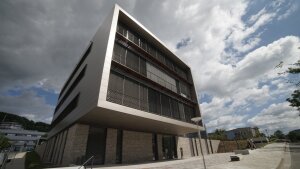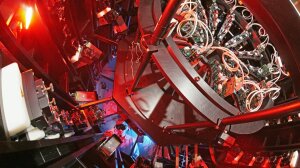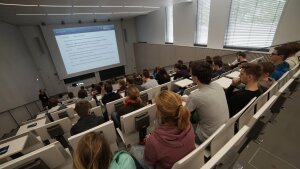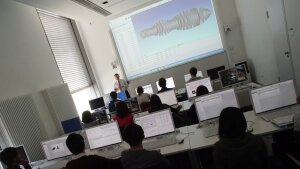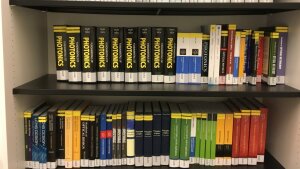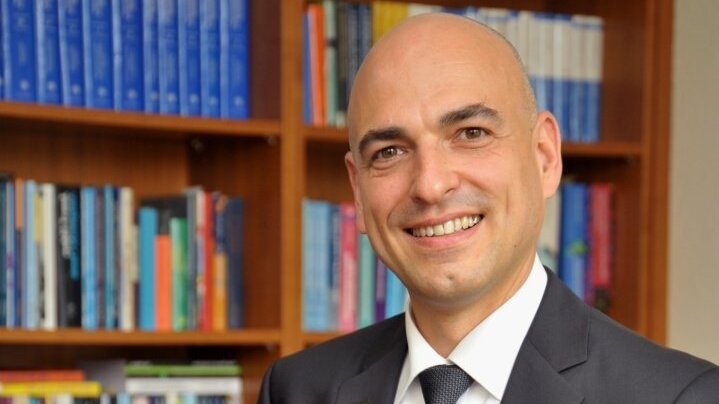
ACP research building at the Beutenberg Campus
Front facet of the ACP research building in Jena.
Image: Jan-Peter Kasper (University of Jena)Parts, but by far not all of our research, are hosted in the ACP research building located at Albert-Einstein-Str. 6, 07745 JenaExternal link. The building was opened in immediate vicinity to the Institute of Applied Physics, the Fraunhofer Institute for Applied Optics and Precision EngineeringExternal link and the Leibniz Institute of Photonic TechnologyExternal link. It has been funded by the State of Thuringia and the German federal government with more than 24 million Euro. It offers 2,600 m² space including top-notch functionalized optical, biological and chemical labs, seminar rooms, offices and an auditorium. Since 2016, the research site evolved into a strategic and integrative hub for interdisciplinary exchange within the main ACP research areas by hosting laboratories for joint research, and enhance the integration of ACP's educational programs into its research.
Substantial installation of research infrastructure and laboratory equipment inside the ACP building were funded by the State of ThuringiaExternal link and the European Funds for Regional Development (EFRE)External link within the infrastructural measures ACP-IPHT-FIB (2015 FOR 0005), ACP-MESOLAB (2015 FGI 0024), ACP-RÖNTGEN-BIOBILD (2017 FGI 0030), and ACP-CNQN (2018).
Currently, the ACP building is hosting the groups of ACP principal scientists Limpert, Rothhardt, Setzpfandt and Pertsch, as well as parts of the research of the ACP principal scientists Eilenberger, Heinemann, Popp, Schmitt, Schubert, and Tünnermann.
Flagship equipment and facilities
Penultimate amplification stage of the high-power POLARIS laser system.
Image: Jan-Peter Kasper (University of Jena)ACP scientists enjoy access to a large variety of facilities and research equipment located at the affiliated university and non-university institutions. These facilities comprise state-of-the-art optical equipment and processing capabilities that stand out within the German university landscape. Our flagship equipment enables advanced research in optics, photonics, and light-driven processes across the fundamental and applied spectrum.
- A cornerstone of this infrastructure is the Relativistic Laser-Plasma Source (RLPS), hosted at the Institute of Optics and Quantum Electronics. Central to the RLPS is the POLARIS laser system - one of the first diode-pumped petawatt-class lasers worldwide and still one-of-a-kind in Germany. POLARIS delivers femtosecond pulses with pulse energies in the 100-joule range and is designed for high stability and repetition rate. It enables and delivers unique research in relativistic plasma dynamics, high-energy photon and particle generation, and nonlinear quantum electrodynamics. Its university ownership makes it a rare and powerful tool for both fundamental and applied studies under extreme conditions.
- The Ultrafast Mid-Infrared and High-Power Fiber Laser Platform, located at the Institute of Applied Physics, is another flagship facility. It features advanced fiber laser systems producing high-average-power femtosecond pulses across a broad spectral range. The platform includes systems for frequency conversion, attosecond pulse generation, and mid-IR to XUV beamlines. These capabilities support research in strong-field physics, coherent spectroscopy, and advanced laser-material interaction including various types of cutting-edge microscopy and spectroscopy.
- For nanoscale light control and photonic device engineering, the university operates comprehensive nanooptics and meta-structure fabrication and characterization facilities at the Abbe Center of Photonics. It includes state-of-the-art tools such as a Raith EBPG5200 electron beam lithography system, focused ion beam mills, atomic layer deposition units, and plasma etchers. Advanced characterization tools include near-field optical microscopes, Fourier-space imaging systems, confocal and nonlinear microscopy setups, and ellipsometry. The uniqueness of this research infrastructure is achieved by the seamless collaboration with the non-university institutes Fraunhofer IOF and Leibniz-IPHT, virtually next door, on the operation of an industrial-scale Vistec SB350OS (Optics Special) electron beam writing facility, capable of nanostructuring wafers with a diameter up to 12 inches including all respective CMOS-compatible processes. These facilities support the entire innovation chain from simulation to fabrication and optical testing of meta-optics and photonic nanostructures and metasurfaces.
- A fourth component are our Advanced Imaging and Adaptive Optics Laboratories. This lab houses super-resolution microscopy modalities (STED, PALM/STORM, SIM), light-sheet microscopes, adaptive optics platforms, and digital holography systems. They enable frontier research in imaging of biological samples, mechanobiology, and soft matter physics by combining custom optics development with advanced computational imaging.
These infrastructures form the technological backbone of the Abbe Center of Photonics' research as well as of the university's LIGHT profile line. They distinguish our work from other institutions by offering one-of-a-kind experimental conditions and integrated platforms across ultrafast optics, structured light, quantum photonics, and biophotonics – all rooted in university-led research and innovation.
Public rooms for science communication
ACP auditorium photonics lecture.
Image: Jan-Peter Kasper (University of Jena)ACP is organizing an thrilling and inspiring program throughout the whole year, including international conferences and workshops, keynote lectures and research group seminars. In the public areas, seminar and meeting rooms can be reserved for events in the area of scientific communication and education in the context of optics and photonics:
The auditorium (capacity of up to 142 people) and the two seminar rooms (for 18 and 42 participants, respectively) of the Abbe Center of Photonics are located in the foyer area in the ground floor of the building, Campus Beutenberg, Albert-Einstein-Straße 6, 07745 Jena. These rooms are of the highest standards, technically fully equipped and can be reserved for optics and photonics communication and networking events such as group seminars, workshops and conferences.
The meeting rooms 106, 207 and 306 (capacity up to 12 people each) are located in the upper floors of the Abbe Center of Photonics according to the first digit of their number. External guests should take the public staircase from the foyer area and ring the bell at the individual doors to the meeting areas or call the secretary's office from the phones at the building's entrances (dial 47561).
For reservation and further information, please contact rebeca.roeppenack@uni-jena.de, +49 3641 947961.
Photonics computer pool
Digital seminar of the Optical System Design Group.
Image: Jan-Peter Kasper (University of Jena)The computer pool in the ACP building is used for PC-based photonics lectures and seminars such as, e.g., computational photonics, optics design, and many others. Apart from the lectures and seminars, the ACP computer pool is open to all members of the University on working days from 7:45 am until 6 pm. Any student and/or scientist can log in via the regular, personalized university account and freely use the following software packages:
- Comsol 5.2a
- MATLAB R2015b
- Math Type 6
- Microsoft Office 2016
- MiKTeX 2.9
- Origin Pro 2015G
- Python 3.5
- Virtual Lab Fusion (User Experience Edition 2016)
- Wolfram Mathematica 11
- ZEMAX OpticStudio 16.5
Photonics library for students
ACP photonics library.
Image: Christian HelgertACP has an in-house library stock of special and up-to-date literature on photonics. This stock particularly hosts books which are strongly recommended for accompanying studies during the first, second and third semester of the M.Sc. Photonics course. This students' literature stock is officially part of the Thuringian University and Federal State Library (ThULB)External link. The photonics literature includes, but is not limited to, the state of the art on fundamentals of photonics, quantum optics, optics design, biophotonics, optical engineering and laser physics.
A detailed list of all available books can be accessed here: ACP photonics library content.External link
All books can be rented for home studies by every photonics Master's degree or doctoral student at the second floor of the ACP main building. To access or to rent any of these books, please contact rebeca.roeppenack@uni-jena.de.
Time-compressed movie of the construction of the ACP building
Laboratories of the Schubert Group in the ACP
PhD in Germany: Here is ACP Laboratory at the Schubert Group | Chemistry careers
Image: Jan-Peter Kasper (University of Jena)